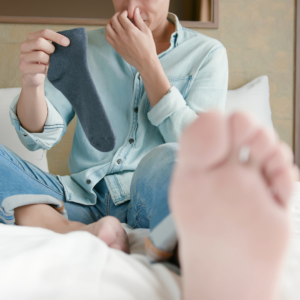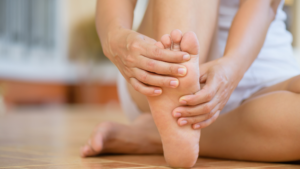Podiatrist in Wyandanch that Accepts Medicaid
The CEC Health Center, a Podiatrist in Wyandanch that Accepts Medicaid, (CEC) is a Federally Qualified Health Center (FQHC)* that provides integrated healthcare services at its Bethpage, Hauppauge and now Glen Cove locations. We provide care with excellence and compassion to historically underserved community members with limited incomes including those with autism, learning and developmental disabilities, and behavioral health concerns.
CEC recently merged with the Melillo Center for Mental Health in Glen Cove, a health center with over 40 years of experience serving the community in the heart of Glen Cove. Renamed CEC at Glen Cove, the Podiatrist in Wyandanch that Accepts Medicaid will continue to provide supports that include mental health clinic, outpatient chemical dependency outpatient services, assertive community treatment (ACT), supervised community residences, supported housing and respite housing.
Common Podiatric Conditions Treated By Podiatrist in Wyandanch that Accepts Medicaid

Did you know that the average American walks between 1,300 and 1,500 miles each year? With so much traveling to be done, the importance of taking proper care of your feet cannot be overstated. At CEC Health Center, our team is well versed in all of the most common podiatric conditions a patient can face. If you begin to face any of the foot problems we go on to list, our podiatrist in Wyandanch that accepts Medicaid will be able to help.
Athlete’s Foot
As the name would suggest, this condition is common in athletes. However, they are not the only ones that suffer from it. Athlete’s foot is a fungal infection that affects the skin of the feet, usually between the toes. The main symptoms of this infection include itching, cracking, blistering, and peeling of the skin. A prescription-strength topical cream can be used to help combat this condition. To prevent this condition from ever occurring, our podiatrist in Wyandanch that accepts Medicaid recommends avoiding the following:
- Walking around barefoot in communal showers, gyms, or pools.
- Wearing socks and shoes that are warm and damp.
- Neglecting to thoroughly wash your feet after athletic activity.
Ingrown Toenails
Though they are more common in children, ingrown toenails can affect anyone and any age. An ingrown toenail occurs when the edge of a nail begins to grow into the surrounding skin. This incorrect growth of the nail can lead to pain, inflammation, and in some cases, infection. Wearing poorly fitting shoes, incorrectly trimming the toenail, and having a family history of suffering from ingrown toenails all increase the likelihood of them taking place. If you’ve noticed the development of one, consider utilizing the following methods of treatment and prevention:
- Washing feet with antibacterial soap and keeping the toes clean and dry.
- Don’t cut nails in a rounded pattern.
- Wearing shoes that fit well and have ample room in the toebox.
Plantar Fasciitis
If you’ve been dealing with heel pain, there is a high chance you’re currently being affected by plantar fasciitis. The plantar fascia is a thick band of tissue that connects your heel bone to your toes. When this tissue becomes irritated and inflamed, it is known as plantar fasciitis. Experiencing heel pain, especially in the morning when getting out of bed or during physical activity, is the most common symptom of this condition. While the exact cause of this inflammation is unknown, risk factors that increase its likelihood include the below:
- Carrying extra weight
- Having a high arch
- Having tight calf muscles
- Participating in activities that repeatedly put stress on the heel
Bunions
Also called hallux valgus, bunions are abnormalities of the feet that cause a bump to develop at the base of your big toe joint. Bunions are often caused by wearing tight/narrow shoes too often, however, they can also be caused by rheumatoid arthritis and trauma that occurs to your feet. When you begin to experience the following symptoms, be sure to reach out to our podiatrist in Wyandanch that accepts Medicaid to help:
- Difficulty moving your big toe
- A visible bump that takes place at the joint of your big toe
- Redness and tenderness around the bump
- Corns or calluses on the bones of your big toe
- Pain when walking
Heel Spurs
Heel spurs are bony calcium growths that take place between your heel bone and the arch of your foot. The development of these growths is caused by a long-term strain that is placed on muscles and ligaments around this area. Risk factors such as being obese, having arthritis, and continuously wearing worn-out shoes also play a role in the formation of heel spurs. While some patients are lucky enough not to face any symptoms as a result of these growths, others are subject to mass amounts of pain and inflammation. Though they are sometimes difficult to detect, our team at CEC Health Center will be able to properly diagnose your heel spurs and move forward with the form of treatment that will yield the optimal results.
Contact Our Podiatrist in Wyandanch that Accepts Medicaid
Here at CEC Health Center, we are committed to providing the typically underserved members of the community with the healthcare services they need. As a multidisciplinary facility, we help patients overcome a wide range of medical issues. Our podiatrist in Wyandanch that accepts Medicaid has years of experience with treating common podiatric conditions and will help you overcome yours. To schedule your appointment for foot care, contact us today!
How Can I Treat My Bunions?
How Can a Podiatrist in Wyandanch that Accepts Medicaid Help My Bunions?
Bunions are bony bumps, that form over time, on the joint where your big toe meets your foot, which can cause great discomfort. Bulging lumps on this joint can be a visible sign of a bunion. The bunion may also be red or swollen, and can cause pain or discomfort in the area. If left untreated, bunions can grow, making it hard to move your toes, especially the affected area near the big toe. Bunions can be caused for many reasons, including rheumatoid arthritis and shoes that do not fit properly. There are many ways to treat bunions, and listed below are some various treatment options to manage and alleviate your pain. Contact our Podiatrist in Wyandanch that Accepts Medicaid at CEC Health Center today to learn more.
Change Shoes
Although treating bunions may be more complicated than simply changing shoes, sometimes this is all you will need to manage your pain. If you are wearing shoes that are too tight, or are not proper footwear, bunions may form or worsen. Your shoes should have sufficient room for your toes. If you wear heels, try switching to heels that are lower than two inches. High heels can put unnecessary pressure on the front of your feet and can eventually cause bunions. If you are wearing uncomfortable shoes, especially ones that are tight or pointed, consider changing your footwear.
Apply Ice
If you have bunions that are swollen, sore, and/or painful, ice is a great treatment option to reduce the uncomfortable effects that bunions can cause. You can use an ice pack, or place ice in a towel and apply it to the affected area. It is important that you do not leave the ice on for longer than twenty minutes at a time, so that you do not get ice burn. However, it is important to talk to your doctor, if you have any sort of nerve damage or circulation problems, before choosing to use ice as a treatment.
Ask Your Podiatrist About Medication
If you are in pain or have swelling, anti-inflammatory, over-the-counter medicines may be able to aid in reducing your symptoms. Medicines, such as ibuprofen, Tylenol, and Aleve, may be able to reduce your discomfort. Talk to your doctor first to make sure taking these types of medications are right for you.
Try Padding
Special pads are available for purchase at places, such as drug stores, to provide extra cushioning to the area of your bunion. Make sure that you talk to your doctor first to make sure that the padding is the right solution and fit for you. If padding is not the correct size, it can add more pressure and may eventually cause more problems.
Consider Surgery
If the other treatments have not provided you with effective results, and you are still in pain, surgical removal of your bunion may be what you need to eliminate the pain and other discomforts you may be experiencing. Surgery, performed by a doctor, is an effective way for adults to remove the swollen tissue and straighten their big toe, thus alleviating your pain and discomfort.
Contact Our Podiatrist in Wyandanch that Accepts Medicaid
Bunions can make daily life uncomfortable and painful, especially when not taken care of properly. There are many different treatment options that you can look into to try and alleviate your discomfort. Here, at the CEC Health Center, your care is our top priority. If you think you need further assistance in your bunion treatment process, please contact our podiatrist in Wyandanch that Accepts Medicaid today.
How Can I Treat My Plantar Fasciitis?
Have you been waking up in the morning experiencing very intense stabbing pain in the arch area of your foot? Do you not stretch often when you wake up in the morning? If you answered “yes” to both of these questions then you might be experiencing plantar fasciitis. Plantar fasciitis is a very common foot injury that people endure that usually hurts them in the morning but then proceeds to stretch out and loosen as you walk around more throughout the day. Even though it is not a very serious injury it is something that should be looked at and diagnosed by a doctor. If you are looking for a Podiatrist in Wyandanch that accepts Medicaid, you should contact CEC Health Center to schedule an appointment.
What is Plantar Fasciitis?
Plantar Fasciitis is a common injury that is located around the heel bone. It is the inflammation of the plantar fascia tendon, which is a thick band of connective tissue that runs along the bottom of the foot to connect the toes to the heel. This then creates a stabbing pain in the heel area that usually hurts a lot more in the morning, then the pain starts to decrease as you move more throughout the day. Even though there is no definite cause for plantar fasciitis there are some factors that might put you more at risk to it.
A runner who is overweight or who does not wear shoes with proper support might be more at risk. Also, switching to a new pair of shoes, that are not broken in, can have an effect on your feet. People who have odd walking mechanics can also be a risk, like flat feet or high arches. Lastly, someone’s occupation that has them on their feet more as well as standing and walking around could be more at risk to develop plantar fasciitis. More activity on the foot’s tendon is a key factor that increases the risk that someone might develop plantar fasciitis. Our podiatrist in Wyandanch that accepts Medicaid would be able to properly educate you on the risk factors of plantar fasciitis and help you prevent developing it.
What Are The Symptoms?
Plantar fasciitis has some particular symptoms that you can test at home to see if you potentially have it. It is still advised to see a doctor so that they can diagnose you properly and provide you with the best type of treatment plan to help ease the pain. Some symptoms of plantar fasciitis are:
- Sharp heel pain
- Pain when flexing the foot tendons
- Foot pain after prolonged rest
- Foot pain after prolonged activity
- Heel tenderness
Best Treatments for Plantar Fasciitis
When seeing your main health physician it is important to tell them all the symptoms and problems that you have been experiencing. They might recommend that you see a podiatrist in Wyandanch that accepts Medicaid, someone who studies and specializes in feet. They have the insight and the expertise to properly diagnose and treat foot problems to get back doing the things you love to do. Plantar fasciitis is a very common condition that people suffer from, so a podiatrist will most likely have prior experience and know the best plan of treatment. There are many different treatments that they can recommend and offer that will be able to reduce the inflammation of the foot tendon. Some of the best treatments that they can offer to their patients are:
- Medications (could reduce the inflammation and the pain of the affected foot)
- Steroid injections (injected to the most painful area of the plantar fasciitis will reduce the pain for around a month, but will also lower the inflammation for longer than that)
- Shockwave therapy (will shock the plantar fasciitis with actual sound waves stimulating blood to the rest of the foot particularly in the inflamed area to help heal it)
- Prescribed orthotics (provide the feet will proper support tailored to your foot)
- Physical therapies (therapist can provide you with exercise and stretches to rebuild the strength of the foot muscles to improve mobility)
- Surgery (this would be a last resort if no other types treatments are working or the plantar fasciitis is that severe)
There are some at-home stretches and remedies that you can do to yourself. These include:
- Changing your shoes
- Maintain a healthy weight and lifestyle
- Stretching the arches of your feet (this can be done by putting your toes at the beginning of a stair and letting the back of your foot hang off by stretching).
- Apply ice to the inflamed areas
How a Podiatrist in Wyandanch that Accepts Medicaid Can Help
CEC Health Center is here to help you by providing a wide array of services that will be able to serve your needs. Their service ranges from podiatry and neurology to dentistry and family medicine. The well-trained staff is always striving to provide their patients with the best care and service by creating a safe, comfortable environment that people enjoy visiting. If you are looking for a podiatrist in Wyandanch that accepts medicaid, you should contact the CEC Health Center to schedule an appointment.
How Should I Deal With Foot Odor?
Are you noticing extreme foot odor coming from you or a loved one? Especially in these hot summer months, our body perspires, as do our feet trapped in closed-toed shoes. This common condition is known as bromodosis. Luckily, this condition is easy, quick, and inexpensive to treat. In more severe cases, a trip to your local podiatrist may be an option to explore. A podiatrist in Wyandanch that accepts Medicaid may be perfect for you and all of your foot health needs. Consider contacting our certified podiatrists here at the CEC Health Center today!
What Causes Foot Odor?
It is normal for your feet to sweat. In fact, your feet have more sweat glands than any other part of your body. To keep your body cool throughout the day, these glands release sweat regularly. Additionally, the presence of bacteria on your feet is normal, which helps break down this sweat as it is being released. However, if bacteria and sweat on your feet build-up, a foul odor may be emitted. People who work on their feet for long periods of time have increased sweat, a medical condition or even poor hygiene may be factors that cause your feet to sweat more, emitting a scent. Excessive foot sweat and odor may be a sign of infection or even athletes’ foot. Visiting a podiatrist in Wyandanch that accepts Medicaid can access your feet and give you the personalized care you need.
Ways To Stop Foot Odor In Its Tracks
If your foot odor hasn’t become severe yet, or you need ways to prevent foot odor in the future, here are some helpful tips to try before visiting a podiatrist in Wyandanch that accepts Medicaid:
- Keep them clean
- Soak them daily
- Keep them dry
- Air then out
- Use disinfectant
- Try essential oils
Podiatrist in Wyandanch That Accepts Medicaid
Looking for a podiatrist in Wyandanch that accepts Medicaid? Look no further! Our certified podiatrists here at the CEC Health Center are here to help you. We can access and work with you to cure your needs and get you back on your feet! For more information visit our website or contact us to schedule an appointment at one of our locations today!
Contact Us
CEC has three sites serving the Long Island community
Nassau County
Bethpage
857 South Oyster Bay Road, Bethpage, NY 11714
Map
(516) 622-8888
Monday through Thursday, 8:00 a.m. – 8:00 p.m.
Friday, 8:00 a.m. – 5:00 p.m.
Glen Cove
113 Glen Cove Avenue, Glen Cove, NY 11542
Map
(516) 622-8888
Chemical Dependency Clinic
Monday: 9:00 am – 8:00 pm
Tuesday: 8:00 am – 8:00 pm
Wednesday: 9:00 am – 8:00 pm
Thursday: 9:00 am – 8:00 pm
Friday: 9:00 am – 5:00 pm
Mental Health Clinic
Monday: 9:00 am – 5:00 pm
Tuesday: 9:00 am – 7:00 pm
Wednesday: 9:00 am – 7:00 pm
Thursday: 9:00 am – 7:00 pm
Friday: 9:00 am – 5:00 pm
Suffolk County
Hauppauge
305 Oser Avenue, Hauppauge, NY 11788
Map
(516) 622-8888
Mon, Wed, Thu, Fri, 9:00 a.m. – 5:00 p.m.
Tue, 12:00 p.m. – 8:00 p.m.

